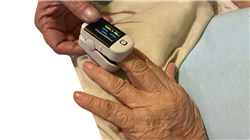University certificate
The world's largest faculty of nursing”
Introduction to the Program
With this 100% online Postgraduate diploma, you will delve into the specific needs of non-oncology patients who require palliative care, providing more holistic and personalized care"

Palliative care has extended its reach beyond oncology patients, encompassing a diversity of patients with chronic and progressive diseases. For nursing professionals, this change implies an adaptation in clinical practice, focusing on alleviating suffering and improving the quality of life of non-oncology patients.
Consequently, this Postgraduate diploma was born, essential for professionals seeking to perfect their skills in the recognition and management of the various symptoms that affect patients in palliative care. In this sense, a meticulous and systematic exploration of patients will be carried out, identifying the particularities of each symptom in order to apply the most appropriate treatment.
Likewise, palliative criteria applicable to common non-oncological diseases, such as neurodegenerative diseases, heart failure or COPD, among others, will be studied in depth. In this way, nurses will be able to identify when a non-oncology patient requires palliative care and how to adapt treatments to the specific needs of each pathology. This is crucial to ensure that patients receive care that not only relieves their symptoms, but also respects their individual needs and preferences.
Finally, graduates will specialize in the management and care of palliative patients, learning to use and apply the standardized languages of nursing interventions (NIC) and nursing outcomes (NOC). Also, they will also be qualified to use various assessment scales, which will enable them to adequately assess patients' needs and progress.
For this reason, TECH has launched a comprehensive, online program, designed to be flexible and adaptable to the particular needs of the students. To access the materials, they will simply need a device with an Internet connection. In addition, the innovative Relearning methodology will be used, which focuses on the repetition of key concepts to facilitate a deep and fluid understanding of the contents.
You will develop specific skills to effectively manage the complex symptoms and intense emotional situations faced by patients with advanced chronic disease"
This Postgraduate diploma in Palliative Care in Non-Oncology Patients for Nursing contains the most complete and up-to-date scientific program on the market. The most important features include:
- Practical cases presented by experts in Palliative Care in Non-Oncology Patients for Nursing.
- The graphic, schematic and practical contents with which it is conceived gather scientific and practical information on those disciplines that are essential for professional practice.
- Practical exercises where the self-assessment process can be carried out to improve learning.
- Its special emphasis on innovative methodologies
- Theoretical lessons, questions to the expert, debate forums on controversial topics, and individual reflection assignments
- Content that is accessible from any fixed or portable device with an Internet connection.
You'll delve into the application of assessment scales, advanced wound care techniques for complex ulcers, and endovenous and subcutaneous pump management.
What are you waiting for to enroll?"
The program’s teaching staff includes professionals from the sector who contribute their work experience to this specializing program, as well as renowned specialists from leading societies and prestigious universities.
The multimedia content, developed with the latest educational technology, will provide the professional with situated and contextual learning, i.e., a simulated environment that will provide immersive education programmed to learn in real situations.
This program is designed around Problem-Based Learning, whereby the professional must try to solve the different professional practice situations that arise during the course. For this purpose, students will be assisted by an innovative interactive video system created by renowned and experienced experts.
You will recognize and correctly analyze a wide range of symptoms, as well as apply specific treatments for each of them to improve the patient's quality of life"

You will be able to identify palliative criteria in non-cancer diseases, applying appropriate treatments according to the specific pathology"
Why study at TECH?
TECH is the world’s largest online university. With an impressive catalog of more than 14,000 university programs available in 11 languages, it is positioned as a leader in employability, with a 99% job placement rate. In addition, it relies on an enormous faculty of more than 6,000 professors of the highest international renown.

Study at the world's largest online university and guarantee your professional success. The future starts at TECH”
The world’s best online university according to FORBES
The prestigious Forbes magazine, specialized in business and finance, has highlighted TECH as “the world's best online university” This is what they have recently stated in an article in their digital edition in which they echo the success story of this institution, “thanks to the academic offer it provides, the selection of its teaching staff, and an innovative learning method aimed at educating the professionals of the future”
A revolutionary study method, a cutting-edge faculty and a practical focus: the key to TECH's success.
The most complete study plans on the university scene
TECH offers the most complete study plans on the university scene, with syllabuses that cover fundamental concepts and, at the same time, the main scientific advances in their specific scientific areas. In addition, these programs are continuously being updated to guarantee students the academic vanguard and the most in-demand professional skills. In this way, the university's qualifications provide its graduates with a significant advantage to propel their careers to success.
TECH offers the most comprehensive and intensive study plans on the current university scene.
A world-class teaching staff
TECH's teaching staff is made up of more than 6,000 professors with the highest international recognition. Professors, researchers and top executives of multinational companies, including Isaiah Covington, performance coach of the Boston Celtics; Magda Romanska, principal investigator at Harvard MetaLAB; Ignacio Wistumba, chairman of the department of translational molecular pathology at MD Anderson Cancer Center; and D.W. Pine, creative director of TIME magazine, among others.
Internationally renowned experts, specialized in different branches of Health, Technology, Communication and Business, form part of the TECH faculty.
A unique learning method
TECH is the first university to use Relearning in all its programs. It is the best online learning methodology, accredited with international teaching quality certifications, provided by prestigious educational agencies. In addition, this disruptive educational model is complemented with the “Case Method”, thereby setting up a unique online teaching strategy. Innovative teaching resources are also implemented, including detailed videos, infographics and interactive summaries.
TECH combines Relearning and the Case Method in all its university programs to guarantee excellent theoretical and practical learning, studying whenever and wherever you want.
The world's largest online university
TECH is the world’s largest online university. We are the largest educational institution, with the best and widest online educational catalog, one hundred percent online and covering the vast majority of areas of knowledge. We offer a large selection of our own degrees and accredited online undergraduate and postgraduate degrees. In total, more than 14,000 university degrees, in eleven different languages, make us the largest educational largest in the world.
TECH has the world's most extensive catalog of academic and official programs, available in more than 11 languages.
Google Premier Partner
The American technology giant has awarded TECH the Google Google Premier Partner badge. This award, which is only available to 3% of the world's companies, highlights the efficient, flexible and tailored experience that this university provides to students. The recognition as a Google Premier Partner not only accredits the maximum rigor, performance and investment in TECH's digital infrastructures, but also places this university as one of the world's leading technology companies.
Google has positioned TECH in the top 3% of the world's most important technology companies by awarding it its Google Premier Partner badge.
The official online university of the NBA
TECH is the official online university of the NBA. Thanks to our agreement with the biggest league in basketball, we offer our students exclusive university programs, as well as a wide variety of educational resources focused on the business of the league and other areas of the sports industry. Each program is made up of a uniquely designed syllabus and features exceptional guest hosts: professionals with a distinguished sports background who will offer their expertise on the most relevant topics.
TECH has been selected by the NBA, the world's top basketball league, as its official online university.
The top-rated university by its students
Students have positioned TECH as the world's top-rated university on the main review websites, with a highest rating of 4.9 out of 5, obtained from more than 1,000 reviews. These results consolidate TECH as the benchmark university institution at an international level, reflecting the excellence and positive impact of its educational model.” reflecting the excellence and positive impact of its educational model.”
TECH is the world’s top-rated university by its students.
Leaders in employability
TECH has managed to become the leading university in employability. 99% of its students obtain jobs in the academic field they have studied, within one year of completing any of the university's programs. A similar number achieve immediate career enhancement. All this thanks to a study methodology that bases its effectiveness on the acquisition of practical skills, which are absolutely necessary for professional development.
99% of TECH graduates find a job within a year of completing their studies.
Postgraduate Diploma in Palliative Care in Non-Oncology Patients for Nursing
The Postgraduate Diploma in Palliative Care in Non-Oncology Patients for Nursing created by TECH Global University is a specialization program designed for those professionals who wish to acquire advanced skills in the comprehensive care of patients with advanced non-cancer related illnesses. This course provides comprehensive training in pain management, symptom control, emotional or spiritual support, and effective communication with patients and families in sensitive situations. During this program, you will delve into the fundamental principles of palliative care for non-cancer patients. You will learn to assess and address the specific needs of these patients, developing key skills to improve their quality of life and overall well-being. In addition, you will gain up-to-date knowledge on the latest trends and approaches in the field of palliative nursing. One of the significant advantages of our program is the integration of theory and practice, which will allow you to develop practical skills and enhance your ability to provide compassionate, quality care to patients with advanced non-oncologic illnesses.
Specialize in palliative care in non-oncology patients
The online modality of this program offers you the flexibility to study from anywhere and at any time, adapting your learning schedule to your work and personal responsibilities. You will have access to virtual classes taught by leading professionals in the field of palliative nursing, as well as interactive teaching resources and innovative learning tools. In addition, you will be supported by a team of specialized tutors and mentors who will guide you to maximize your learning and professional development in palliative care. Upon completion, you will earn a recognized qualification that supports your education and experience in this crucial field of healthcare. This qualification will open up new career opportunities and enable you to make a significant contribution to the well-being and quality of life of patients in situations of advanced non-cancer illness. Make the most of the opportunity to specialize in palliative care for non-oncology patients. Enroll now and become an expert in providing compassionate, quality care to those who need it most!







